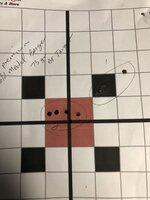- Messages
- 412
- Reactions
- 532
I must be on a roll today. Even Colt and LMT change vendors on a frequent basis. I bought an LMT upper on a Gunbroker auction once. I had a PWA lower that I had owned for a few decades. An armorer friend and I mated the two together. I ended up holding the delta ring down while he used a rubber mallet to get the handguards in. It's the tightest fitting rifle I own. If you don't think it will perform as good as any factory weapon, come see me. Let's go to the range. FWIW, PWA was bought out by LMT when LMT started so I've probably got the equivalent of a factory LMT since it's built on the same tooling, using the same parts, etc.
In any event, when factory guns change vendors frequently so it makes me believe that your argument won't stand up to scrutiny. Add to that, some aftermarket companies make parts that exceed milspec. How would you feel about a Spikes upper and lower running a Sionics 1 x 8 barrel with a Toolcraft BCG and delivering shot groups under an inch at a hundred yards after 10,000 rounds?
Apparently, unless your rifle maker has held a government contract, it ain't bubblegum. Because we all know .Gov always buys and builds the best of everything.












